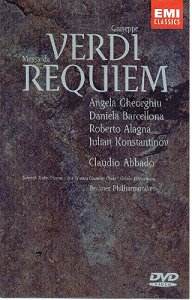Comparing this performance of Verdi’s Requiem on both
CD and DVD has been a fascinating experience, not least because my opinion
of the performance has been significantly altered. When I first heard
the CD last year I thought it a somewhat reserved interpretation which
occasionally hangs fire, at moments intensely inspirational, at others
gaudily bland; seeing it I now feel it is not in the slightest inward
looking, indeed it is often provocatively electrifying. Somehow, the
performance visually is a deeper more emotional experience, not least
because of Abbado himself (of which more later). It is also much more
tautly held together than the CD recording initially suggested.
What both CD and DVD unite in doing is giving this
performance a thrillingly immediate recording balance. Moments such
as the pianissimo voices moments after the opening of the Dies Irae
have a stunning precision of sound; indeed, it is rare on a recording
of this work to find the pronunciation so clear and well focussed. If
the climactic moments of the Dies Irae bring some congestion in sound
on the CD, the DVD opens it up to a remarkable degree. Moreover, hearing
the disc the first time you would be hard pressed to guess that Abbado
divides his violins antiphonally; once you see that this is exactly
what he does revisiting the CD becomes a thrilling audible experience:
textures are indeed transparent, something which is not immediately
noticeable on a first hearing. There are some drawbacks, however. The
timpani, much less apparent in both of these formats than on many other
recordings of the work, now seems much more reticent than the audible
experience suggested first time around; indeed, the lack of a palpable
bass on the DVD is a real drawback. The other drawback with the DVD
is that it has completely reversed my opinions of the quartet.
Roberto Alagna, on CD at least, struck me as impressive,
not least during the Ingemisco where his tone was both even and glowing.
It still is, but on DVD there is evidence to suggest that what appears
easy to the ear is in fact a bit of a struggle visually. Daniela Barcellona,
thrilling on CD, is less so on DVD, and I now think she is the weakest
of the quartet. Mesmerising on film is Julian Konstantinov, surely one
of the most exciting basses of recent years. Whilst he sweats interminably
compared with the others his performance now has even greater depth
of tone and only Nesterenko for Muti is better during the Mors stupebit.
Angela Gheorghiu stands head and shoulders above her colleagues, both
on CD and DVD. The voice is magnificent and she is nowhere better than
in the Libera me. What was already a formidable achievement on CD becomes
an even greater one when you actually see her sing: she is simply peerless,
and intensely moving to watch. Indeed, she even outshines at the beginning
of the Libera me the greatest soprano to undertake this taxing part,
Leontyne Price for Karajan in his 1967 La Scala film. Price’s opening
phrase is garbled beyond belief (in fact, it is little short of incomprehensible);
Gheorghiu, by contrast, is word perfect, every syllable given weight
and transparency.
Claudio Abbado is a shadow of his former self. Gaunt
and hollow eyed it is a shock to see him; he looks as if he is about
to cross the Styx. However, his conducting (without a score as usual)
is a revelation. He coaxes the most sublime dynamics from both orchestra
and chorus, speaking volumes with the smallest gesture. Most moving
is the close of the work where Abbado closes his eyes and holds his
hand to his chest, and a capacity audience spellbound for what seems
like an eternity.
There are currently three DVDs of Verdi’s Requiem available:
this new EMI one, Abbado’s performance from the 1982 Edinburgh Festival
with the London Symphony Orchestra and Karajan’s 1967 La Scala performance
and all of them are exceptional, amongst the greatest performances of
the Requiem ever recorded. Both Abbado versions are recorded live, the
Karajan set at La Scala, but without an audience, and with a very peculiar
style of filming which focuses more on the conductor than on anything
else. Quite easily the most profound interpretation is the one under
review here (a truly intense Lux Aeterna eclipses all others) but the
most electrifying is that which Abbado recorded in Edinburgh.
Cast wise, all three recordings offer tremendous line-ups.
The Berlin Abbado performance offers the cream of today’s young singers.
His Edinburgh Festival performance had Margaret Price, Jessye Norman,
Jose Carreras and Ruggero Raimondi, and they remain one of the most
integrated on record. Karajan had Leontyne Price, Fiorenza Cossotto,
Luciano Pavarotti and Nicolai Ghiaurov, Of the three DVDs Abbado (Edinburgh)
is the most stunningly sung – indeed, the more I watch this performance
the more extraordinary I find it – but Karajan has two simply peerless
performances from Leontyne Price (never equalled on record) and Luciano
Pavarotti (never matched before or since in the Ingemisco, which is
a tour de force of both precision and beauty). Ideally, lovers of this
work must own all three DVDs because they will give between them an
ideal performance of this notoriously difficult work. If you have to
choose one then it should be Abbado (Edinburgh).


